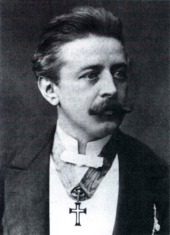Philipp Fahrbach Sr. on:
[Wikipedia]
[Google]
[Amazon]
 Philipp Fahrbach Sr. (25 October 1815 – 31 March 1885) was an Austrian musician. He was in the orchestra of Johann Strauss I in Vienna, and later led his own ensemble which followed the tradition of the Strauss orchestra; he composed dance music and marches. He was also director of a military band.
Philipp Fahrbach Sr. (25 October 1815 – 31 March 1885) was an Austrian musician. He was in the orchestra of Johann Strauss I in Vienna, and later led his own ensemble which followed the tradition of the Strauss orchestra; he composed dance music and marches. He was also director of a military band.
''Österreichisches Biographisches Lexikon''. Retrieved 21 April 2022."Fahrbach, Familie"
''Oesterreiches Musiklexikon Online''. Retrieved 21 April 2022. In 1835, he formed his own orchestra. In 1838, when Johann Strauss I was away from Vienna during '' Fasching'', Fahrbach's orchestra benefited from his absence and became popular. From that year, his orchestra often played at royal court balls. From 1841 to 1846, he was conductor with an infantry regiment; on leaving, he formed again his own ensemble. From 1852, after the death of the elder Johann Strauss, his orchestra alternated with the Strauss orchestra at court balls."The Fahrbach Family"
''The Johann Strauss Society of Great Britain''. Retrieved 21 April 2022. In 1856, he returned to conducting the band of an infantry regiment, leaving in 1865. He then formed an ensemble, which became the resident orchestra at ''
 Philipp Fahrbach Sr. (25 October 1815 – 31 March 1885) was an Austrian musician. He was in the orchestra of Johann Strauss I in Vienna, and later led his own ensemble which followed the tradition of the Strauss orchestra; he composed dance music and marches. He was also director of a military band.
Philipp Fahrbach Sr. (25 October 1815 – 31 March 1885) was an Austrian musician. He was in the orchestra of Johann Strauss I in Vienna, and later led his own ensemble which followed the tradition of the Strauss orchestra; he composed dance music and marches. He was also director of a military band.
Life
Fahrbach was born in 1815 in Vienna, son of Georg Leonhardt Fahrbach and his wife Karoline ''née'' Koberger. His brothers Joseph (1804–1883) and Friedrich (1809–1867) were musicians, and they gave Philipp early musical training. Aged about 14, he joined the orchestra of Johann Strauss I, playing flute; Strauss sometimes consulted him about the instrumentation of his works."Fahrbach, Philipp d. Ä. (1815–1885), Kapellmeister und Komponist"''Österreichisches Biographisches Lexikon''. Retrieved 21 April 2022."Fahrbach, Familie"
''Oesterreiches Musiklexikon Online''. Retrieved 21 April 2022. In 1835, he formed his own orchestra. In 1838, when Johann Strauss I was away from Vienna during '' Fasching'', Fahrbach's orchestra benefited from his absence and became popular. From that year, his orchestra often played at royal court balls. From 1841 to 1846, he was conductor with an infantry regiment; on leaving, he formed again his own ensemble. From 1852, after the death of the elder Johann Strauss, his orchestra alternated with the Strauss orchestra at court balls."The Fahrbach Family"
''The Johann Strauss Society of Great Britain''. Retrieved 21 April 2022. In 1856, he returned to conducting the band of an infantry regiment, leaving in 1865. He then formed an ensemble, which became the resident orchestra at ''
Café Sperl
Café Sperl is a traditional Viennese café located at Gumpendorfer Straße 11 in the Mariahilf sixth district of Vienna, Austria. The café is on the Austrian Register of Historic Places.
History
Jacob Ronacher founded the cafe as ''Café Ronach ...
''. Fahrbach died in Vienna in 1885.
His son (1843–1894) was a musician; he conducted his father's orchestra, and was a military bandmaster. He composed popular dance music and marches.
Writings and compositions
In the 1840s, Fahrbach contributed regularly to the ''Allgemeine Wiener Musik-Zeitung''; topics included dance music and military music. He composed about 400 Viennese dances and marches. He wrote two operas: ''Der Liebe Opfer'' (1844) and ''Das Schwert des Königs'' (1845); also ''Singspiel
A Singspiel (; plural: ; ) is a form of German-language music drama, now regarded as a genre of opera. It is characterized by spoken dialogue, which is alternated with ensembles, songs, ballads, and arias which were often strophic, or folk-like ...
e'' and church music.
References
External links
* {{DEFAULTSORT:Fahrbach Sr., Philipp 1815 births 1885 deaths Musicians from Vienna 19th-century Austrian male musicians 19th-century Austrian composers Composers from Vienna